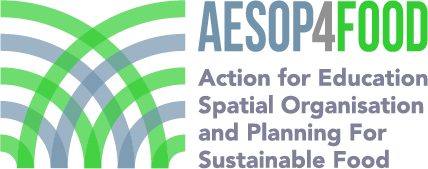AESOP4FOOD
Action for Education, Spatial Organisation and Planning For Sustainable Food
On February 29, 2024, the next online course on sustainable food planning will start. Registration is closed but all the presentations and recordings are in open access available in the course wiki and the webpage.
he Erasmus plus collaboration AESOP4FOOD aims to develop future leadership in sustainable food planning, to contribute to food security, food justice, and healthier environments.
It builds upon the need for sustainable food planning that is argued by the International Panel of Experts in Sustainable Food Systems in their “Common Food Policy for the European Union” and a ‘Long Food Movement’. These are setting a reform for the whole food system, bringing together the various sectoral policies that affect food production, processing, distribution, and consumption, and refocusing all actions on the transition to sustainability.
Planning for sustainable food production and food provision is more than ever urging us to look for more effective, equitable, and just approaches that radically change not only the way we grow food but the very core of our living space.
This collaboration consists of institutes of higher education and NGOs from Spain, France, Belgium, and Poland. The project is coordinated by Stichting LE:NOTRE Institute (NL) which fosters the development of knowledge in the field of landscape. The consortium partners are LE:NOTRE Institute, Polytechnical University of Madrid, Ghent University, Warsaw University of Life Science, Montpellier Supagro, with the NGOs the Spanish city network for agroecology, the Foundation Pracownia Dóbr Wspólnych, and Terres en Villes.
AESOP4FOOD will create a joint interdisciplinary European learning activity on sustainable food planning for both students and teachers to foster European citizenship and democratic leadership. It will develop the discussion within academia and the planning professions on the need for sustainable food systems and collect and disseminate evidence of good practice in higher education by providing an inclusive open access course that makes use of digital environments and web-based collaboration that also is available for adult learners and learners with fewer opportunities.
Collaboration will be formed with community members in the form of Living Labs, a set of user-centered, open innovation ecosystems based on a systematic co-creation approach, integrating research and innovation processes in real-life communities and settings.
The results will be firstly the AESOP4FOOD curriculum: an online interactive open-access course, a set of five modules on sustainable food planning. Secondly, a teacher’s guidance with the theoretical background of sustainable food planning, the learning goals and competence framework of the AESOP4FOOD curriculum, methodical guidance for interdisciplinary learning settings, workshop tutoring, applying blended learning methods, assessment criteria and evaluation methods, and assignment descriptions. Substantial capacity and skills development among the core target groups of the AESOP4FOOD project, which will be transferable to other European audiences and upscaled in other European locations.
Our methodical framework embraces a pedagogical action research cycle, which will allow for piloting, early testing, and continuous adaptation and improvement based on the feedback of the learners, teachers, and community partners.
Activities of the project
- Development of the AESOP4Food curriculum (design, testing, evaluation, exploitation and dissemination)
2. Piloting the AESOP4Food curriculum using two blended learning events. The blended learning events consist of the following elements: AESOP4Food online course, a series of Living Labs linked to the AESOP4Food, Intensive Study Programmes (Learning Teaching Training activities)
3. Two Multiplier Events during which we involve a wider stakeholder network and diversified audiences in the development and dissemination of the AESOP4Food intellectual outputs.
AESOP4FOOD online course and 10-day workshops
The online course consists of five phases: exploring the field of play, analysing the local foodscape, collaborative goals setting and vision, strategy and interventions, evaluation & monitoring.
The course relates to food governance (food councils) and policies, land management, agroecological urbanism, agroecology, agronomy, the economics of food, food systems and chains, local food networks, foodscapes, metropolitan food planning, food waste, food communities and participation, food justice, and security. The online course on sustainable food planning will use self-study materials to build a common theoretical foundation. The material will embrace theories, methods, tools, case studies, and terminology. It will be available in the course Wiki. All of this will be embedded into a blended learning concept consisting of self-study phases, virtual classroom sessions with peers/experts, and virtual teamwork with international fellow students.
For information on the online course 2023 that ran from March 2 until the first of June 2023, you can view this page. The scheme of the next course in the spring of 2024 will be announced in December 2023.
Three 10-day workshops will provide the living labs with the input of international students from the partner universities. They will be embedded in a local and regional context in Spain, Belgium, and France, and organised in close cooperation with the local partner NGO and other stakeholders. The wider local public will be invited for the presentation of the results. The innovative ideas generated by the workshops can be followed up by local and/or regional actors, possibly in cooperation with the local university.
If you want to know more about the AESOP4FOOD project, or plan to participate in the activities, just send an e-mail to office@ln-institute.org.






